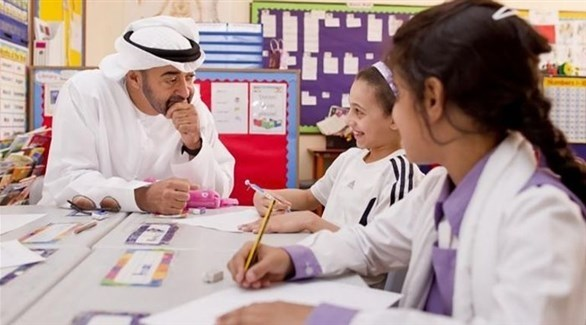Official Website For Dr. Ali Bin Tamim | all rights reserved

In Arabic, the word “Ta’leem [literal: marking]” is derived from the verb “’allam,” which means ‘to mark’ something with a distinctive feature, and to leave a mark in an educational sense does not only entail knowledge, but also leadership and guidance. Education is one of the greatest aspirations in life, and making a difference is something all education systems have in common. The more well-thought and purposeful an education system is, the more effective and valuable it becomes. This is especially true when backed by planning and considerations that value the past, relate to the present, and pave the path for the desired future.
This means there cannot be a standard education system that could be applied everywhere to get the same results. Rather, the effectiveness of each system should be measured in light of the objectives it aims to achieve, objectives that could be addressed and developed through consultation, expertise, and sound judgement.
With his unique character and unmatched wisdom, the founding father Shiekh Zayed bin Sultan Al Nahyan has revealed the treasures of what education means by making it a never-ending process of personal growth that benefits wider society and contributes to national development. Our founding father knew that education, as a long-lasting endeavour of accumulating knowledge, must occur at stages. It begins with recalling, understanding, and fostering a nation’s authentic body of knowledge and values, followed by the introduction of supporting knowledge and foundational sciences, and concludes with the ongoing development of this noble idea: people are the wealth of this nation as well as the promoters and subjects of human development at the same time.
The actions and words of the late Sheikh Zayed (may God have mercy on his soul) were a manifestation of this awareness. His beautiful poems, derived from Nabatean poetry, express this unique understanding and appreciation of education and learning. Below are translations of some of his poems in which he addresses the youth and encourages them to seek education. In these poems, our late founding father associates education with morals, understanding, hard work, patriotism, and welfare:
Rise with the merits of wisdom and responsible behavior,
You are the people of culture, knowledge, and mastery,
What you have learnt is all true and real,
This homeland is calling those who will build and protect it.
Anyone familiar with the development of the education system in the UAE would find that it combines the two aspects of knowledge and virtue, as expressed by Sheikh Zayed:
This is my advice to men of knowledge,
Consider your actions carefully,
Work hard and well and learn,
Justice makes its bearer just,
Be patient and you shall reap.
He also said:
Men of knowledge and virtue
Will have legacy and a life of integrity
The UAE has always lived by these values. The country has developed its tools, enriched knowledge and sciences, and updated its educational curriculums and teaching methods to achieve its objectives: teach, guide, and lead the citizens of the UAE throughout each stage of learning to make them contributors to human civilization while upholding the authentic value system of their own civilizational heritage.
When looking at the first decisions issued right after High Highness Sheikh Mohamed bin Zayed Al Nahyan became President of the UAE, one would clearly see the significance of those decisions, which included restructuring the education system, establishing a federal authority for quality education affiliated with the UAE Cabinet, and restructuring the Education and Human Resources Council under the chairmanship of His Highness Shiekh Abdullah bin Zayed Al Nahyan.
Recent developments also show the support teachers have as the Abu Dhabi Executive Council recently approved spending AED 6.6 billion to increase the pension of UAE nationals working in the emirate’s public schools to 80% of their salary.
The spirit of learning that guides the education system in the UAE is the basis for today’s effective strategies, clear agendas, and real achievements. A few days ago, His Highness Sheikh Khaled bin Mohamed bin Zayed Al Nahyan, Member of the Abu Dhabi Executive Council and Chairman of the Abu Dhabi Executive Office, endorsed the expansion of the charter schools programme, thereby bringing the total number of charter schools to 31 with more than 46 students. The charter schools programme is an innovative educational model based on public-private partnership. Since 2018, the programme offered more than 34,500 school admissions and supported over 93% of students to help them progress academically.
These schools focus on providing sustainable quality education and promoting the students’ academic performance. They also employ the best international practices, experiences, and local talents with a curriculum especially designed to achieve the objectives of the UAE’s development initiatives. Moreover, the programme seeks to help each student grow individually to become an influential contributor to society and the market.
The leaders of the UAE not only share a spiritual connection, but also a far-reaching approach that touches every aspect of life. This is particularly true in relation to the UAE’s education system. It all started with an agreement on the meaning of learning as conceived by the founding father Sheikh Zayed. Soon after came Shiekh Khalifa bin Zayed who empowered this meaning, and today we have Sheikh Mohamed bin Zayed who, following the footsteps of his father, creatively developed and nurtured it. The connection our leaders have in common can be seen in the gradual development of education in the UAE. It is manifested in the way in which the education system is constantly reassessed and supported to create a brighter future based on the lessons of a glorious past and the demands of a challenging present.